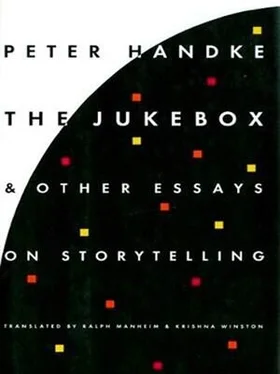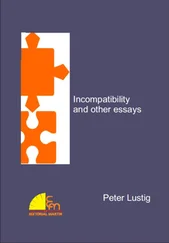That’s all very well, but don’t you realize that those horrors were not mere horrors. Look at it this way. You were just going to record them, but in spite of yourself you were very nearly drawn into storytelling, and if in the end you avoided its verb form, the historical past, it was only by a deliberate trick. And besides, your horror stories are more colorful, or in any case more suggestive, than the infinitely peaceful incidents of your epic tiredness?
But I’m not interested in suggestiveness. I have no desire to persuade, not even with images. I only want to remind each one of you of his own very narrative tiredness. And its visual quality will soon become apparent, at the end of this essay — right now if I’ve become tired enough in the meantime.
But quite aside from your anecdotes and fragmentary glimpses, what is the essence of the ultimate tiredness? How does it work? What good is it? Does it enable a tired person to act?
It is itself the best action, because it is in itself a beginning, a doing, a getting under way, so to speak. This getting under way is a lesson. Tiredness provides teachings that can be applied. What, you may ask, does it teach? The history of ideas used to operate with the concept of the “Thing in itself”; no longer, for an object can never be manifested “in itself,” but only in relation to me. But the tirednesses that I have in mind renew the old concept and give it meaning for me. What’s more: they give me the idea along with the concept. And better still, with the idea of the thing, I possess, almost palpably, a law: The thing not only is, but should be just as it appears at the moment. And furthermore: in such fundamental tiredness, the thing is never manifested alone but always in conjunction with other things, and even if there are not very many, they will all be together in the end. “And now even the dog with its barking says: All together!” And in conclusion: such tirednesses demand to be shared.
Why so philosophical all of a sudden?
Right — maybe I’m not tired enough. In the hour of the ultimate tiredness, there’s no room for philosophical questions. Time is also space, and space-time is also history. Being is also becoming. The other becomes I. Those two children down there before my tired eyes are also I. And the way the older sister is dragging her little brother through the room has a meaning and a value, and nothing is worth more than anything else — the rain falling on the tired man’s wrist is worth as much as his view of the people walking on the other side of the river, both are good and beautiful, and that is as it should be, now and forever — and above all it is true. How the sister-I grabs me, the brother, by the waist — that is true. And in the tired look, the relative is seen as absolute and the part as the whole.
What becomes of perception?
I have an image for the “all in one”: those seventeenth-century, for the most part Dutch floral, still lifes, in which a beetle, a snail, a bee, or a butterfly sits true to life, in the flowers, and although none of these may suspect the presence of the others, they are all there together at the moment, my moment.
Couldn’t you try to express yourself concretely and not indirectly through historical images?
Very well; then sit down — I hope you’ve become tired enough by now — with me on that stone wall at the edge of the dirt road, or better still, because we’ll be closer to the ground, squat down with me on the strip of grass in the middle of the road. See how all at once, with the help of this colored reflection, the world-map of the “all together” is revealed. Close to the earth, we are at the same time far enough away to see the rearing caterpillar, the beetle boring into the sand, and the ant hobbling over an olive at the same time as the strip of bark rolled into a figure eight before our eyes.
Not an illustrated report; tell me a story.
A few days ago the dead body of a mole was making its way through the dust of this Andalusian road as slowly and solemnly as the statues of sorrow that are carried about on stands during Easter Week here in Andalusia; under it, when I turned it over, there was a procession of glittering-gold carrion beetles. And last winter, on a similar dirt road in the Pyrenees, I squatted down in the exact same way as we are squatting now, and watched the snow falling in small grainy flakes, but, once it lay on the ground, indistinguishable from grains of light-colored sand; in melting, however, it left strange puddles, dark spots very different from those made by raindrops, much larger and more irregular as they trickled away into the dust. And as a child, at just the same distance from the ground as we are now, I was walking in the first morning light with my grandfather, on just such a dirt road in Austria, barefoot, just as close to the ground and just as infinitely far from the dispersed craters in the dust, where the raindrops had struck — my first image, one that will let itself be repeated forever.
At last your metaphors for the effects of tiredness introduce not only small-sized objects but also human measure. But why is the tired individual always you and no one else?
It always seemed to me that my greatest tirednesses were also ours. Late one night in Dutovlje in the Karst, the old men were standing at the bar. I had been at odds with them. Tiredness tells its story through the other, even if I’ve never heard of him. Those two over there with the slicked-down hair, the gaunt faces, the split nails, and fresh shirts are farm workers, labradores, who have worked hard all day in the wilds and have come a long way on foot to the town bar, unlike all the others who are standing around here; the one over there, for instance, wolfing down his meal all alone, is a stranger to the region, whose home office has sent him to the Land Rover assembly plant in Linares far from his family, and the old man who can be seen day after day standing at the edge of the olive field, a little dog at his feet, his elbows propped on a fork of the tree, grieving for his dead wife. “Fantasy” comes to the ideally tired man but is different from the fantasy of the sleepers in the Bible or the Odyssey , who have visions: without visions his fantasy shows him what is. And now, though not tired, I have the gall to tell you my fantasy of the last stage of tiredness. In this stage the tired god sat tired and feeble in his tiredness, but — just a notch tireder than a tired human had ever been — all-seeing, with a gaze which, if acknowledged and accepted by those seen, regardless of where in the cosmos, would exert a kind of power.
That’s enough about stages! Speak to me for once about the tiredness you’re thinking of, just as your thoughts come to you, in confusion.
Thanks! Such confusion is at present just the thing for me and my problem. So let’s have a Pindaric ode, not to a victor but to a tired man. I conceive of the Pentecostal company that received the Holy Ghost as tired to a man. The inspiration of tiredness tells them not so much what should, as what need not, be. Tiredness is the angel who touches the fingers of the one dreaming king, while the other kings go on sleeping dreamlessly. Healthy tiredness is in itself recovery. A certain tired man can be seen as a new Orpheus; the wildest beasts gather around him and are at last able to join in his tiredness. Tiredness gives dispersed individuals the keynote. The more sleepless nights he lived though, the more brilliantly the private eye Philip Marlowe succeeded in solving his cases. The tired Odysseus won the love of Nausicaä. Tiredness makes you younger than you ever have been. Tiredness is greater than the self. Everything becomes extraordinary in the tranquillity of tiredness — how extraordinary, for instance, is the bundle of paper which the astonishingly easygoing man over there is carrying across the astonishingly quiet Calle Cervantes. Epitome of tiredness. On Easter Eve long ago, at the commemoration of the Resurrection, the old men of the village used to lie prone before the tomb, wearing red brocade cloaks instead of their blue work clothes, the sunburned skin of their necks split into a polygonal design by their lifelong exertions; the dying grandmother in her quiet tiredness appeased the whole household, even her incorrigibly choleric husband; and every evening here in Linares I watched the growing tiredness of the many small children who had been dragged to the bars: no more greed, no grabbing hold of things, only playfulness. And with all that, is there still any need to say that even in low-level images of tiredness distinctions are preserved?
Читать дальше












